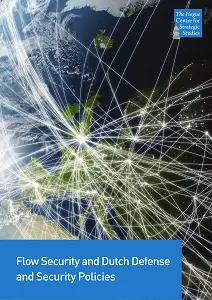Go to the report
Flow security: a distinct strategic challenge
We live in a world shaped by complex supply chains. The functioning of societies and economies fundamentally depends on uninterrupted access to global flows of goods and services, information, ideas, technology, capital, and people. These flows transcend borders, are dynamic and interconnected, and cannot be understood in geographic terms only. Contemporary adversaries understand that societies are vulnerable to disruptions of critical flows, and have developed hybrid strategies and capabilities to target them. Furthermore, growing interconnectedness has facilitated the growth of negative flows such as human trafficking, the trade in illicit goods including arms and drugs, international terrorism, and cybercrime, which have the potential to undermine and disrupt the resilience of societies.
Acknowledging the need to ensure uninterrupted access to global flows and counter negative flows, the Dutch Ministry of Defense designated the security of these global flows, flow security as a strategic challenge. Policy makers should take flow security seriously and prepare accordingly. But do they understand the challenge sufficiently?
Flow security for the Netherlands
Global flows yield enormous economic, social, and cultural value – whether through trade, foreign investment, tourism or the exchange of knowledge and ideas. In 2016, to name but one example, travel and tourism created $7.6bn in GDP (10.2% of global GDP) and directly sustained 108.7 million jobs worldwide.
Flow security is a topical subject for the Netherlands in particular. Dutch prosperity depends heavily on the integrity of the flows into, from and through the country. The Netherlands generates two-thirds of its GDP through trade. The country has a unique position as a ‘system country’ within the global economy. As the ‘gateway to Europe’, the country’s hubs service large volumes of commodities (Port of Rotterdam, Schiphol Airport), of people (Schiphol Airport) and of data (Amsterdam Internet Exchange, AMS-IX). At the same time, this interconnectedness renders the Netherlands vulnerable to flow disruptions and negative flows.
How to address flow security?
Although many different state and non-state actors have a stake in flow security, they do not necessarily have or feel the responsibility to provide and maintain that security. Clearly, governments have a responsibility in facilitating positive flows while keeping negative flows in check. But what should or could be left to the, often private, owners of flow particles, flow channels and flow hubs? What about the global commons, those parts of the global flow domains where no national authority resides? How to protect the flows themselves, other than the channels (trade routes, digital networks) and hubs (harbors, airports, internet exchange centers) through which they flow? Are security and defense organizations sufficiently prepared to deal with the challenges at hand?
The HCSS study Flow Security and Dutch Defense and Security Policies, commissioned by the Dutch Ministry of Defense, aims to help policymakers prepare for such questions and challenges. It analyzes flow security as a distinct strategic challenge for the Netherlands. It defines what flow security entails, describes its relevance to the Netherlands, analyzes its implications for security and defense policies, and outlines a set of policy recommendations concerning the implications of flow security for Dutch security and defense policies and the role, tasks and capabilities of the Dutch defense organization. The report also provides a valuable empirical analysis of the five critical flows, namely flows of goods and services, information, ideas and technology, capital, people and environmental agents, on which Dutch prosperity and stability depends.






